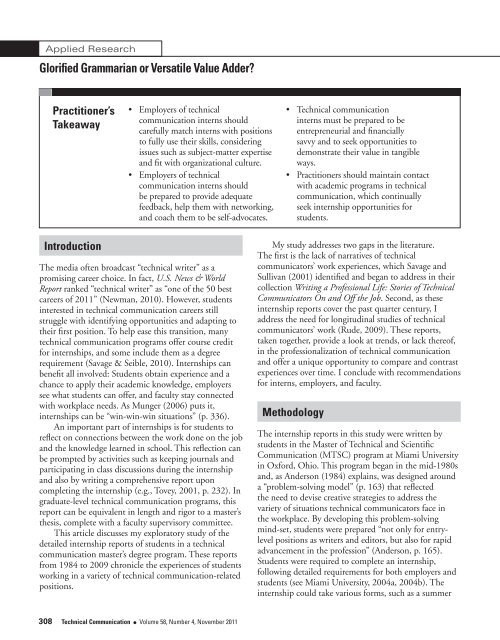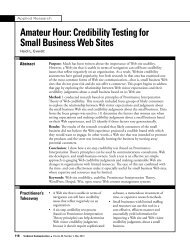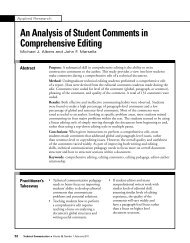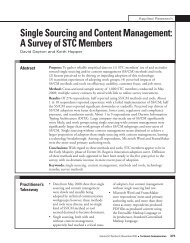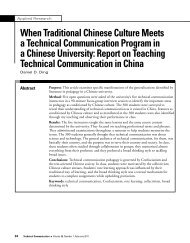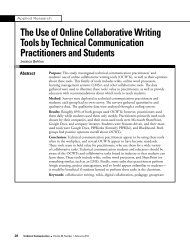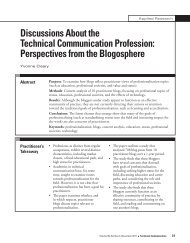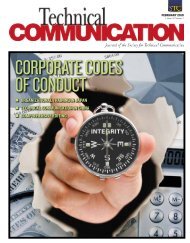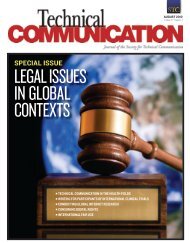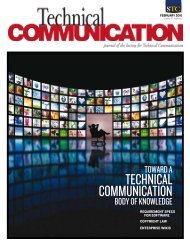SPECIAL ISSUE
Download: November 2011 - Technical Communication - Society for ...
Download: November 2011 - Technical Communication - Society for ...
- No tags were found...
Create successful ePaper yourself
Turn your PDF publications into a flip-book with our unique Google optimized e-Paper software.
Applied ResearchGlorified Grammarian or Versatile Value Adder?Practitioner’sTakeaway• Employers of technicalcommunication interns shouldcarefully match interns with positionsto fully use their skills, consideringissues such as subject-matter expertiseand fit with organizational culture.• Employers of technicalcommunication interns shouldbe prepared to provide adequatefeedback, help them with networking,and coach them to be self-advocates.• Technical communicationinterns must be prepared to beentrepreneurial and financiallysavvy and to seek opportunities todemonstrate their value in tangibleways.• Practitioners should maintain contactwith academic programs in technicalcommunication, which continuallyseek internship opportunities forstudents.IntroductionThe media often broadcast “technical writer” as apromising career choice. In fact, U.S. News & WorldReport ranked “technical writer” as “one of the 50 bestcareers of 2011” (Newman, 2010). However, studentsinterested in technical communication careers stillstruggle with identifying opportunities and adapting totheir first position. To help ease this transition, manytechnical communication programs offer course creditfor internships, and some include them as a degreerequirement (Savage & Seible, 2010). Internships canbenefit all involved: Students obtain experience and achance to apply their academic knowledge, employerssee what students can offer, and faculty stay connectedwith workplace needs. As Munger (2006) puts it,internships can be “win-win-win situations” (p. 336).An important part of internships is for students toreflect on connections between the work done on the joband the knowledge learned in school. This reflection canbe prompted by activities such as keeping journals andparticipating in class discussions during the internshipand also by writing a comprehensive report uponcompleting the internship (e.g., Tovey, 2001, p. 232). Ingraduate-level technical communication programs, thisreport can be equivalent in length and rigor to a master’sthesis, complete with a faculty supervisory committee.This article discusses my exploratory study of thedetailed internship reports of students in a technicalcommunication master’s degree program. These reportsfrom 1984 to 2009 chronicle the experiences of studentsworking in a variety of technical communication-relatedpositions.My study addresses two gaps in the literature.The first is the lack of narratives of technicalcommunicators’ work experiences, which Savage andSullivan (2001) identified and began to address in theircollection Writing a Professional Life: Stories of TechnicalCommunicators On and Off the Job. Second, as theseinternship reports cover the past quarter century, Iaddress the need for longitudinal studies of technicalcommunicators’ work (Rude, 2009). These reports,taken together, provide a look at trends, or lack thereof,in the professionalization of technical communicationand offer a unique opportunity to compare and contrastexperiences over time. I conclude with recommendationsfor interns, employers, and faculty.MethodologyThe internship reports in this study were written bystudents in the Master of Technical and ScientificCommunication (MTSC) program at Miami Universityin Oxford, Ohio. This program began in the mid-1980sand, as Anderson (1984) explains, was designed arounda “problem-solving model” (p. 163) that reflectedthe need to devise creative strategies to address thevariety of situations technical communicators face inthe workplace. By developing this problem-solvingmind-set, students were prepared “not only for entrylevelpositions as writers and editors, but also for rapidadvancement in the profession” (Anderson, p. 165).Students were required to complete an internship,following detailed requirements for both employers andstudents (see Miami University, 2004a, 2004b). Theinternship could take various forms, such as a summer308 Technical Communication l Volume 58, Number 4, November 2011


